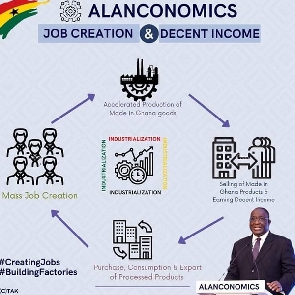Opinions of Thursday, 3 November 2022
Columnist: Terry Afram-Kumi
Import substitution industrialization (isi) and alanconomics
Ghana’s current economic situation demands that industrial policy ought to take centre stage for the country to achieve self-local manufacturing sufficiency. This is practically possible with the industrial economics practised by Alan Kyerematen, which I have termed “Alanconomics”. The number one vision of “Alanconomics” is to transform Ghana into an industry-driven economy that is capable of providing jobs and a decent income (cash) for Ghanaians through local manufacturing. The local mass production of more of what we consume and practical action of importing less is possible. IMPORT SUBSTITUTION INDUSTRIALIZATION (ISI): The boosting of domestic factories to produce locally more Made-In-Ghana products and the reduction of Ghana’s reliance on manufactured imports is what we call “Import Substitution”. There are two (2)parts to Import Substitution Industrialization (ISI); (I) Ramping up of local manufacturing (II) Review of manufactured imports of what can be locally produced. Import Substitution Part 1: This first part of “import substitution”, is ramping up of local manufacturing. As a country, we need to ensure that more production of Made-In-Ghana products will flow from the 127 1D1Fs and other local factories to meet local demand. Alanconomics has delivered a practical industrial roadmap of 10 priority industrial sectors where local production of Made-In-Ghana products can be ramped up. Import Substitution Part 2: The second part of “import substitution” is the corresponding action of reducing imports of what we can produce in large quantities. Executive action and the political will from the President to implement a thorough review of our imports of rice, poultry, toilet tissues, bottled water, tin tomatoes, iron rods, vegetable oils, pasta, fruit juice, etc. into Ghana. The simultaneous aggressive boosting of local manufacturing to fill the import gap is one that Alan Kyerematen has shown time and again that Ghana can achieve. This will help Ghana to achieve a nationwide equitable and sustainable mass local production that increases jobs and high wages in the country. Ghana’s heavy reliance on imported manufactured products has again exposed the economy to external shocks of huge magnitude. It’s time executive action is taken by the President to scale down these imports so the country can deliver massive acceleration and support for local production in Ghanaian factories. When this is achieved, the economy will save billions of foreign exchange, which otherwise will go to other countries and also stabilize our local currency. CONCLUSION: Industrialization with Ghanaian characteristics of Alanconomics is now the solution to our economic crisis. The future of Ghana’s economy is bright with this golden opportunity to massively accelerate our local industrial manufacturing to achieve a self-sustainable economy. The path to an industry-driven economy is possible is not an easy one. As a country, we achieved “Import Substitution” under Covid-19 by producing more hand sanitisers locally and nose masks, led by the excellent industrialist Alan Kyerematen. Alanconomics is the practical industrial economic way out of this economic crisis. We can do it again !!!













